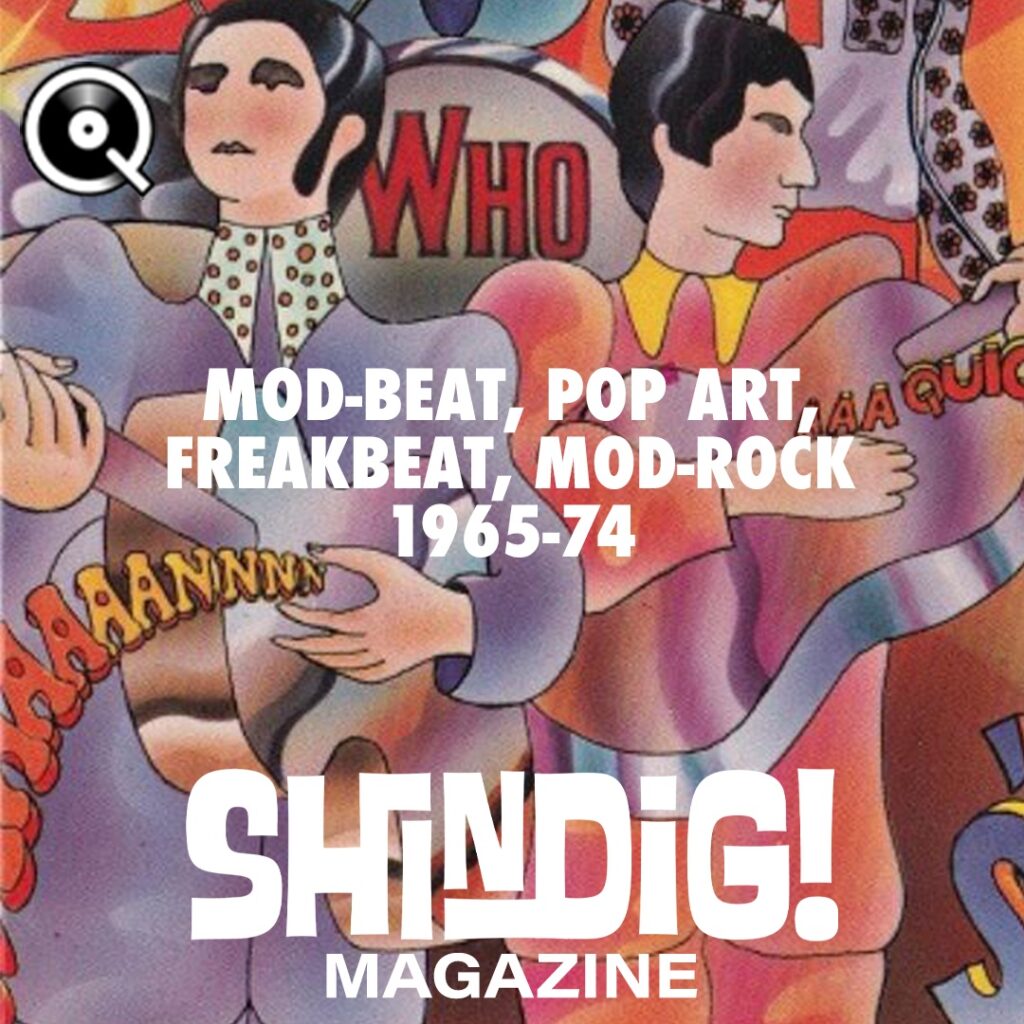Exclusive Shindig! Qobuz playlist #10: Mod-beat, Pop Art, Freakbeat, Mod-Rock 1965-74
We’re very excited to be media partners with the truly unique online streaming platform and download store Qobuz. The 10th of our monthly bespoke playlists, which take in all manner of genres and sub-genres, scenes and beyond, then and now, is an ideal fit for The Eyes’ cover story of issue #148

Play here or use the scrollable frame with tracklist the bottom of the page. You can sign up for a free trial today. Plans start from £10.83 per month. For more on Qobuz read our interview with MD Dan Mackta here
Mod may have started in the late ’50s in East London, where a coterie of modern-jazz loving young men took inspiration from the sharply dressed Italian immigrants, and later made newspaper headlines in 1964, when the new trend in post-war consumerism went big, but it wasn’t really until the following year when boutique clad acts, taking mod fashion to the next level, gained acclaim and charted. The Who and The Small Faces soon inspired provincial UK acts, as well as European, American, and groups in the colonies, to create an amphetamine-laced racket. Slashing guitars, feedback, runaway drums, on occasion some Hammond organ, a phrase in vocals that borrowed from both Townshend’s Who powerpop melodies and the husky blue-eyed soul of The Small Faces’ Steve Marriott, were the key influences. But as in all grass roots musical movements, the young musicians took things further, having blind moments of inspiration, which although on the whole avoided the hit parade, have resonated through subsequent generations on the back of punk, the mod revival, and Britpop.
If the “real” mods were purist adherents to Black American music and would have viewed the artists gathered here as “pop”, the explosion of Carnaby Street fashion, pop magazines and TV, brought these bands to wider attention as mod expanded its roots, eventually morphing into psychedelia, rock, and glam. The three hours of music on this playlist are testament to the massive effect the mod phenomena and its clash of vibrant music and bright fashion cast across the mid-late ’60s. Elements of the music were still felt into the ’70s.
The Who and The Small Faces were the best known and most successful of the ’65 wave of mod bands, but the George Martin produced Action, may well have been the band that the choosier mods appreciated, due to their choice delivery of soul harmonies. ‘I’ll Keep Holding On’, their second single from ’66, takes The Marvelettes’ Tamla gem and recasts it as a British pop record, one that is not lacking in soul or new moves. Although hits eluded this wonderful band, a young mod by the name of Paul Weller compiled a collection entitled The Ultimate Action in 1980 for Edsel Records, which brought them to a whole new generation of teenage mods, hungry for new old music. The Creation were big in Germany, but once again thanks to Weller, who featured their ‘Biff Pang Pow’ Planet 45 on the insert of The Jam’s All Mod Cons collage, were brought to the attention of the ’79 crowd.
But of course, many of the bands featured here would have not called themselves mods. The Who took from the culture, inspired by their friend Pete Meaden. Daltrey liked rock ’n’ roll. Moon surf music. Townshend, however, saw riding the trend as an opportunity too good to miss. The majority of acts inspired by The Who, undoubtedly did the same, taking their cues from their hero’s adoption of mod, such as Ealing neighbours The Eyes, whose feedback and auto destruction took pop art to new levels on their 1965 opus ‘When The Night Falls’, which somehow foreshadows post-punk and everything gloomy to follow. John’s Children (featuring a young Marc Bolan) also expanded on The Who’s remit. Les Fleur De Lys took all of this one step further, recording a magnificent version of The Who’s ‘Circles’ for Immediate in ’66. The Game must have been one of the gnarliest bands ever signed to the respectable Parlophone. Art Pop left commerciality and melody at the door.
Whilst not strictly mod bands per se, The Birds and The Artwoods (featuring brothers Ron and Art Wood) were major label acts coming from R&B. ‘Say Those Magic Words’ by the newly monikered Birds Birds was issued on Robert Stigwood’s Reaction label, who also as it happens had The Who on their books. Their cover of The McCoys’ number was cast in a mod-ish hue, signalling the end of this promising band. Brother Art’s ‘Keep Lookin’’ was toughened up club-soul, with more than enough toughness to merit its inclusion here. This playlist avoids the many iterations of mid-60s club-soul and blue-eyed soul acts popular in the UK and continent at the time, Spain in particular. This music was certainly closer to the inspirations of the original mods, but in hindsight lacked the spark and excitement of the bands selected here, which were all attempting to do something new.
Bigger pop bands also flitted with the style, including Brummies The Move and Aussie giants The Easybeats. ‘I Can Hear The Grass Grow’ and ‘Sorry’ definitely possess an amped up attack. And indeed, we include some poppier elements here too, which Swedish bands like Evil Eyes and Tages brilliantly ran with. Spaniards Los Brincos’ ‘The Train’ is another melodic Who-ish delight. There’s the pre Strawbs Fire and the excellent ‘Father’s Name Is Dad’, NYC’s garage band The Blues Magoos, who for their third album cut their hair in a mod style and offered the brilliant Move-like ‘Sybil Green (Of The In Between)’, and the snappily dressed Californian anglophiles Powder, who didn’t even get to release a record during their brief lifetime. Todd Rundgren’s Nazz referenced The Who and Small Faces brilliantly, and The Choir, whose unreleased ‘If These Are Men’ from 1969 is about as mod as you can get.
By the late ’60s mod was essentially all over, but before bowing out, The Small Faces backed French legend Johnny Hallyday, giving him some of their grunt, and German bubblegum-rock act Asterix carried a mash-up of The Who and Small Faces into 1970. This wasn’t mod music, but the crashing chords and soulful vocals remained.
Nobody in their right mind would call ’70s Ohioan powerpop band Raspberries mod, but there was something in their style that referenced it. ‘I Don’t Know What I Want’, from their final album, 1974’s Starting Over, cops The Who in both their contemporary and ’66 guise, and it’s a great way to draw things to a close.
© Jon ‘Mojo’ Mills /Shindig! magazine in partnership with Qobuz



How did provincial UK acts and groups from other countries contribute to the mod movement? Visit Us Telkom University